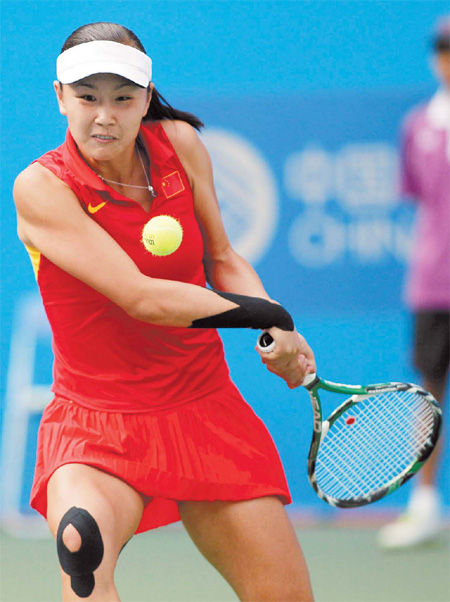GUANGZHOU - Peng Shuai teetered on the brink of a psychological meltdown in Guangzhou, but kept her composure long enough to crush Akgul Amanmuradova of Uzbekistan 7-5, 6-2 in the singles tennis final for her third title at the games.
|

Peng Shuai of China hits a return to Akgul Amanmuradova of Uzbekistan in the women's singles final at the Asian Games on Tuesday. Peng won 7-5, 6-2. [Photo/China Daily]?
|
The day's glory on the court belonged to a heroine not a hero, with world No 71 Peng mastering her demons to win the event after earlier helping China to its first team title at the Asiad in 24 years.
She also won bronze in the doubles with partner Yan Zi.
Peng, the only Chinese player to compete in all three events, said the frenetic schedule put her under unprecedented pressure.
"I was a complete psychological mess before playing my match in the team event," said the 24-year-old, who came unglued in her previous two Asian Games but made up for lost time this year by adding grit to the core of the Chinese squad.
"This will be an excellent experience and memory for the rest of my life," she said after defeating world No 69 Amanmuradova from Uzbekistan.
"I've encountered a lot of setbacks in my career, but I think the experience has been helpful. I've learned a lot from it."
Fans have routinely questioned Peng's mental game through a career that has been peppered with examples of her cracking under pressure in title matches.
She suffered an emotional breakdown against Zheng Jie at the National Games in Nanjing five years ago, breaking into tears as she trailed 1-3 in the second set and later refusing to attend the post-game press conference.
However, it was a different character altogether that smashed through Japanese legend and top seed Kimiko Date Krumm to win a hard-fought semifinal for a shot at the singles gold in Guangzhou.
The epic match took such a toll on Peng that her leg cramped up afterwards and she came into Tuesday's match sporting a bandage.
"I had leg cramps the day before yesterday and it was painful," she said. "I received some treatment over the past two days but it still hurt when I chased the ball."
Not that she appeared anything like the walking wounded on court, pinballing the ball in all directions with an attacking baseline game that eventually saw Amanmuradova unravel.
When the Uzbek, who helped her country defeat China at the Doha Games four years ago, was serving for the first set at 5-4, Peng held it together and turned the tables by breaking her twice. She then romped to victory in the second set.
"When the opportunity came my way, I wasn't about to let it go," she said.
The opportunity presented itself much more readily in Guangzhou than it did back in 2002 at the Busan Games, when Peng was called up on short notice due to the sudden retirement of Li Na.
The then 16-year-old failed to win a single match in Korea and the squad returned home empty handed.
Four years later, she was scheduled for the team event in Doha but never saw a minute's action as Li, Zheng and Yan crashed out in the second round despite the latter two picking up a pair of Grand Slam doubles titles earlier that year.
Peng said much of the credit for her return to grace must go to her Chinese-American coach Allan Ma, better known as Ma Weikai in China. He took the job in April after Peng and Frenchman Tarik Benhabiles, the former coach of Andy Roddick, parted ways.
"My coach has more confidence in me than I do," said Peng, who ran to the stands to give Ma a hug after the victory. "He just encouraged me to hold on and give it my best shot."
Peng won 10 of 11 matches in Guangzhou. The only blip on her record came in the doubles semifinal when she and partner Yan narrowly lost to Chinese Taipei's Chang Kai Chen and Heish Su Wei.
"Peng showed her star power and the kind of skill level that belongs to a top-level pro," said Jiang Hongwei, head coach of the Team China.
"I need to thank her, and we hope that her victory will help push China's tennis success even further."
Although she has struggled to crack the elite of the world rankings, Peng said this is on her to-do list.
"It takes time," she said. "It's better to have some hope than none at all."

